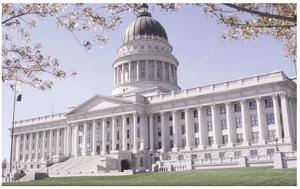
SALT LAKE CITY – Utah Republicans and Democrats are embroiled in yet another brouhaha about the disorderly GOP caucus back on Mar. 5.
Democrats want an open and transparent analysis of the mistakes that led to a GOP presidential primary that they say was dysfunctional, exclusionary and a national embarrassment to all Utahns.
The Republican leaders here privately say that it’s none of the opposition party’s business what went on and why during their closed statewide caucus.
“The Utah GOP made voting in their presidential primary as difficult as possible, blocking many Utahns from exercising their constitutional right to vote (on Mar. 5),” according to Thom DeSirant, the executive director of the Utah Democratic Party.
“Now, they’re trying to avoid accountability – and the Republican supermajority (in the Legislature) is happy to oblige.”
What has Democrats fuming is the fact that a Aug. 21 post mortem on the GOP caucus that was scheduled during the recent special session in the Legislature was abruptly re-scheduled by – who else? – Republicans.
Robert Axson, the chair of the Utah GOP, admits that he is grateful that the Aug. 21 hearing didn’t take place.
That’s hardly surprising, given that the Legislature’s Government Operations Interim Committee was scheduled to hear a presentation that included more than 1,700 negative comments from GOP voters as well as complaints about physical barriers to voting from the Disability Law Center.
That presentation was prepared by Daryl Acumen, a data analyst and former vice chair of Republican Party in Utah County. Acumen has previously crossed swords with the Utah GOP’s leadership over their stubborn loyalty to the state’s caucus-convention system.
In the chaos of the caucus night on Mar. 5, DeSirant insists that fewer than 10 percent of Utah Republicans got to cast their ballots in the midst of long lines, disorganized precincts and technical difficulties.
“Meanwhile,” he said, “Utah Democrats voted (via mail-in ballots) in a statewide primary that saw higher turn-out and no widespread complications.”
Even Axson acknowledges that the GOP primary became disorderly when some precinct volunteers failed to show up and the remainder of precinct officials became overwhelmed by the sheer numbers of would-be voters.
But DeSirant remains critical of the primary effort, calling GOP precincts dangerous understaffed and poorly organized, leaving voters with an extremely limited window of time to cast their votes.
He believes that an honest Legislature should step to oversee that process, since Article 1, Section 17 of the Utah Constitution guarantees the free exercise of the fight of suffrage.
It is unclear whether the Legislature will ever reschedule the presentation that was originally intended to be heard on Aug. 21.
“These are the tactics of crooked politicians, “ DeSirant said, condemning the Legislature’s seeming disinterest.
“They have no place in our state,” he argues. “Utahns deserve a transparent government and they deserve answers.”

